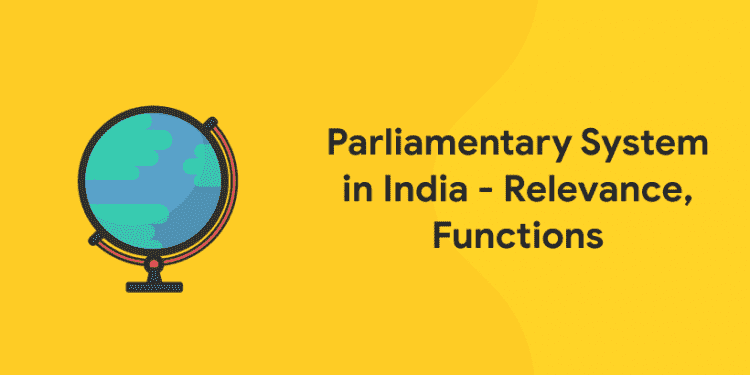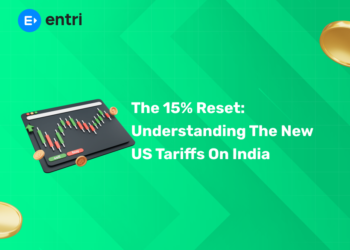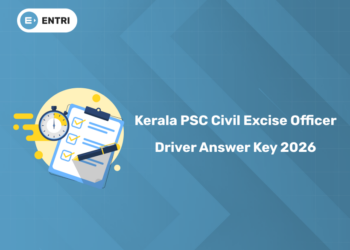The constitution of India is the source of Power for the Parliament. The Indian Parliament was established according to the Constitution of India, which stipulates that “[t]here shall be a Parliament for the Union which shall consist of the President and two Houses to be known respectively as the Council of States and the House of the People.” The term Parliament is originated from the French word “Parler” which means to discuss. It is the highest law-making body constituted under Article 79. In this article let us discuss the Parliamentary System in India – Relevance, Functions.
Freely Download the e-book PDF for Current Affairs August 2020
Sources of Indian Constitution – Check the Borrowed Features.
Parliamentary System in India
India is having a bicameral legislature at the center and the parliamentary system in India is borrowed from the Government of India Act 1935. Articles 74 and 75 deal with the parliamentary system of government at the Union level and Articles 163 and 164 contain provisions with regard to the States.
Parliament building (Sansad Bhavan) is at New Delhi and it was designated by Edwin Lutyens and Herbert Baker in 1912. The Foundation stone of Parliament was laid on 12th February 1921 by H.R.H, the Duke of Connaught, and inaugurated by Lord Irwin on 18th January 1927. The shape of the Parliament building is oval shape.
In the Parliamentary system, our country is headed by a president, but the positions are formal. The real head of the government is the Prime Minister. Thus, all the real executive powers are vested within the Prime Minister.
Click here for Weekly Current Affairs
Features of Parliament System
- Bicameral Legislature System- The people elect the members of the Lower House. The Lower House/ Lok Sabha can be dissolved, in case, the term of the government is over, or there is no scope of government formation due to lack of majority in the house. In India, the President can dissolve the Lok Sabha on the recommendation of the Prime Minister.
- Rajya Sabha was constituted under Article 80. Also called ” House of Elders”` It is a permanent body. 1/3rd of its members retire every year. The maximum strength is 250.
- Lok Sabha was constituted under Article 81. The maximum strength is 552. The No-confidence motion, money bill, etc can ONLY be introduced in Lok Sabha. The tenure of Lok Sabha is 5 years.
- Executive – Is the part of Legislature- In our country, the person should be a member of parliament to become a member of the executive. Within this, the power is more divided. Power is more evenly spread out in the power structure of parliamentarians. The members of the executive have to follow the principle of secrecy in matters such as proceedings, executive meetings, policymaking.
- Nominal and Real Head: The head of the state President, holds a ceremonial position and is the nominal executive, whereas, the Prime Minister is the real executive.
- Majority Party Rule: The party which wins majority seats in the elections of the Lower House(Lok Sabha) forms the government. President invites the leader of the majority party in Lok Sabha to form the government. In case no party has got a majority, the President invites a coalition of parties to form the government.
- Joint Responsibility: All council of ministers is collectively responsible to the parliament. The Lok Sabha of parliament has the ability to dismiss a government by getting the no-confidence motion passed in the house. Lok Sabha is empowered to introduce no-confidence motion against the government.
- Opposition: The opposition party in the parliament plays an important role in checking the subjective use of authority by the ruling political party. It also helps to show the other possible ways to solve a problem.
- Sovereign Civil Service: The civil servants’ advice and implement decisions of the government. The civil service secures efficiency in the performance of services and responsibilities.
Attempt Rank – booster GK Quizzes
Functions of the Indian Parliament
Some of the functions of the Parliamentary System in India are as follows:
-
Legislative
According to the 7th Schedule of the constitution, the legislative powers are distributed between the center and the state as Union List, State List, and Concurrent List. The center can make law on any of the subjects in the Union list or in the Concurrent List. It also has powers to make laws regarding the state legislature when a national emergency declared, two or more states make the request and also at the time of President’s rule.
-
Constitutional
Can make a proposal for amendment of the constitution. Bill for amendment can be initiated in either House of Parliament. Some bills need sanction from half the state legislative assemblies.
-
Executive
Parliament exercises control over the executive through procedural devices such as question hour, zero hours, calling attention motion, adjournment motion, half-an-hour discussion. Brings about discussions and directs attention towards the working of all government departments. Lok Sabha can remove the council of ministers by passing a no-confidence motion which in turn will make the elected government more responsible.
Grants and Funds in Indian Budget
-
Financial
Parliament’s approval is a must for the expenditures by the Executive. No tax can be imposed without the authority of law. The budget is also put for parliament approval. The Public Accounts Committee and the Estimates Committee record the spending of the government. And scrutinizes the account and bring out the cases of irregular, unauthorized, or improper usage in public expenditure.
-
Elective
The elected members of the parliament can participate in the election of the President. The members of the parliament participate in the election of the Vice-President. Members of various parliamentary committees are also elected. The Lok Sabha elects its Speaker and Deputy Speaker were as Rajya Sabha elects its Deputy Chairman.
-
Judicial
Parliament has the power to impeach the President, the Vice-President, the judges of the Supreme Court, and the High Court. Also, correct its members or outsiders for the violation of privilege or its contempt.
Attempt Daily GK and Subject-wise mock tests! Download Entri App!
-
Miscellaneous
Imposing emergency and take decisions on issues of national and international importance and in matters regarding the increase or decrease the area of the country, change names of states or places, alter the boundary of the states.
Download Entri App for more Static GK and Current Affairs notes
Check some useful links:













